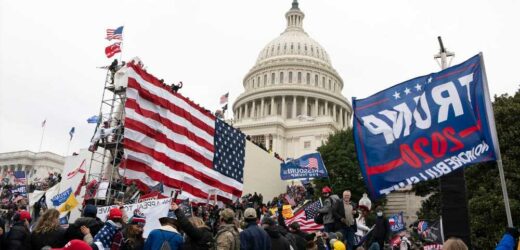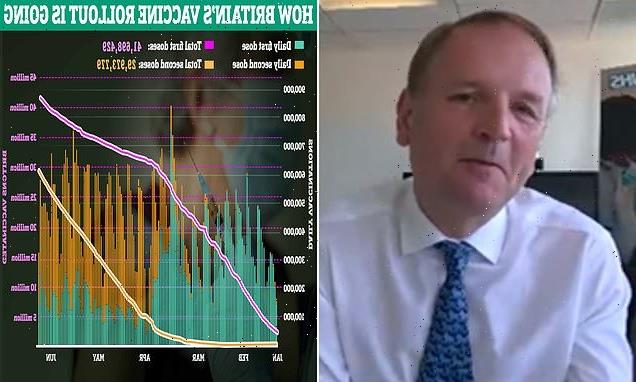More On:
capitol riot
Vladimir Putin: I’m surprised we haven’t been blamed for BLM yet
Minnesota law firm fired pro-Trump employees after Capitol riot, lawsuit alleges
Ashli Babbitt’s husband sues for name of Capitol cop who shot her during riot
Alleged NJ Proud Boy leader charged in Capitol riot told mom he ‘led the storm’: feds
The White House on Tuesday released a report that designates the Jan. 6 Capitol riot a “domestic terrorist attack” and endorses an internet purge of “extremist” content.
The description is likely to draw stiff disagreement from allies of former President Donald Trump who say that the riot, which disrupted certification of President Biden’s victory, has been used to facilitate political censorship.
The Biden administration report also calls for beefed up cooperation between the feds and private internet companies and requests the Justice Department to review whether to request a new anti-domestic terrorism law.
The Capitol riot is described as an example of domestic terrorism alongside the 1921 Tulsa race massacre, which killed an estimated about 75-300 people, and the 1995 Oklahoma City bombing, which killed 168.
“Domestic terrorist attacks in the United States also have been committed frequently by those opposing our government institutions. In 1995, in the largest single act of domestic terrorism in U.S. history, an anti–government violent extremist detonated a bomb at the Alfred P. Murrah Federal Building in Oklahoma City, killing 168 people – including 19 children – and injuring hundreds of others,” the report says.
“In 2016, an anti–authority violent extremist ambushed, shot, and killed five police officers in Dallas. In 2017, a lone gunman wounded four people at a congressional baseball practice. And just months ago, on January 6, 2021, Americans witnessed an unprecedented attack against a core institution of our democracy: the U.S. Congress.”
Biden requested the report during his first week in office — just days after the mayhem on Capitol Hill, for which about 440 people face criminal charges.
Although the term terrorism broadly defines the use of violence for political reasons, the terminology used to describe the events of Jan. 6 often inflames debate. For instance, many Democrats use the term “insurrection,” which Republicans see as overheated.
Many details remain unknown about the riot, including whether any participants pre-planned the breach of the Capitol security perimeter.
Three Trump supporters died of medical emergencies during the riot and another, Ashli Babbitt, 36, was fatally shot by a police officer as she tried to climb through a busted-out window into the House Speaker’s Lobby. One Capitol Police officer, 42-year-old Brian Sicknick, himself a Trump supporter, died of a stroke after fighting off the crowd. His death originally was misreported as the result of a bludgeoning with a fire extinguisher. At least two police officers and one alleged rioter died by suicide following the riot.
A senior administration official defended the inclusion of the Capitol riot during a press call, noting that the report also describes the 2017 congressional baseball shooting of Republican members of Congress, which was committed by a left-wing supporter of Sen. Bernie Sanders (i-Vt.).
“This is a strategy that is agnostic as to political ideology or off the spectrum. What matters is when individuals take their political or other grievances and turn that unacceptably, unlawfully into violent actions. That’s where it comes within the sway of this document. That’s where it becomes something that’s deemed domestic terrorism and requires the sort of response that not only protects public safety but in a sense protects [against] threats to our democratic integrity,” he said.
The document says the US endorses the Christchurch Call to Action to Eliminate Terrorist and Violent Extremist Content Online, which seeks to curb content available online following the 2019 mass-murder of 51 people at a mosque in New Zealand. The State Department quietly endorsed that private-public international push for restrictions in May.
“[T]he United States endorses the Christchurch Call to Action to Eliminate Terrorist and Violent Extremist Content Online. We applaud language in the Christchurch Call emphasizing the importance of tackling the very real threat posed by online terrorist content while respecting human rights and freedom of expression,” the new document says.
Much of the report stresses private sector cooperation. Platforms such as Facebook and Twitter already have banned or indefinitely suspended Trump and many of his supporters following the Capitol riot, and the new Biden administration document may be used to bolster their stances.
“Recruiting and mobilizing individuals to domestic terrorism occurs in many settings, both in–person and online. These activities are increasingly happening on Internet–based communications platforms, including social media, online gaming platforms, file–upload sites, and end–to–end encrypted chat platforms, even as those products and services frequently offer other important benefits,” the White House document says.
“The widespread availability of domestic terrorist recruitment material online is a national security threat whose front lines are overwhelmingly private–sector online platforms, and we are committed to informing more effectively the escalating efforts by those platforms to secure those front lines.”
The document does not specifically call for new laws or domestic surveillance, but asks the Justice Department to review the idea.
“[W]e must ask the question of whether legislative reforms could meaningfully and materially increase our ability to protect Americans from acts of domestic terrorism while simultaneously guarding against potential abuse of overreach. New criminal laws, in particular, should be sought only after careful consideration of whether and how they are needed to assist the government in tackling complex, multifaceted challenges like the one posed by domestic terrorism and only while ensuring the protection of civil rights and civil liberties,” the document said.
The Patriot Act, passed after 9/11 to enable the surveillance of international terrorists, subsequently was secretly reinterpreted to allow the dragnet bulk collection of domestic call records, which was exposed in 2013 and ended by legislation.
The new document says “the Department of Justice is examining carefully what new authorities might be necessary and appropriate.”
Share this article:
Source: Read Full Article






